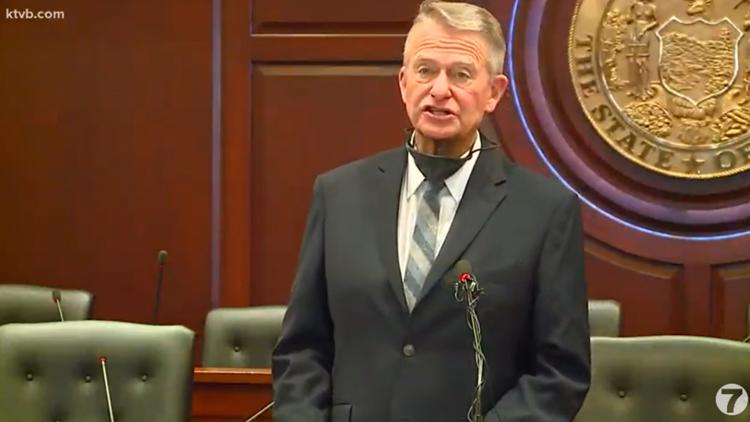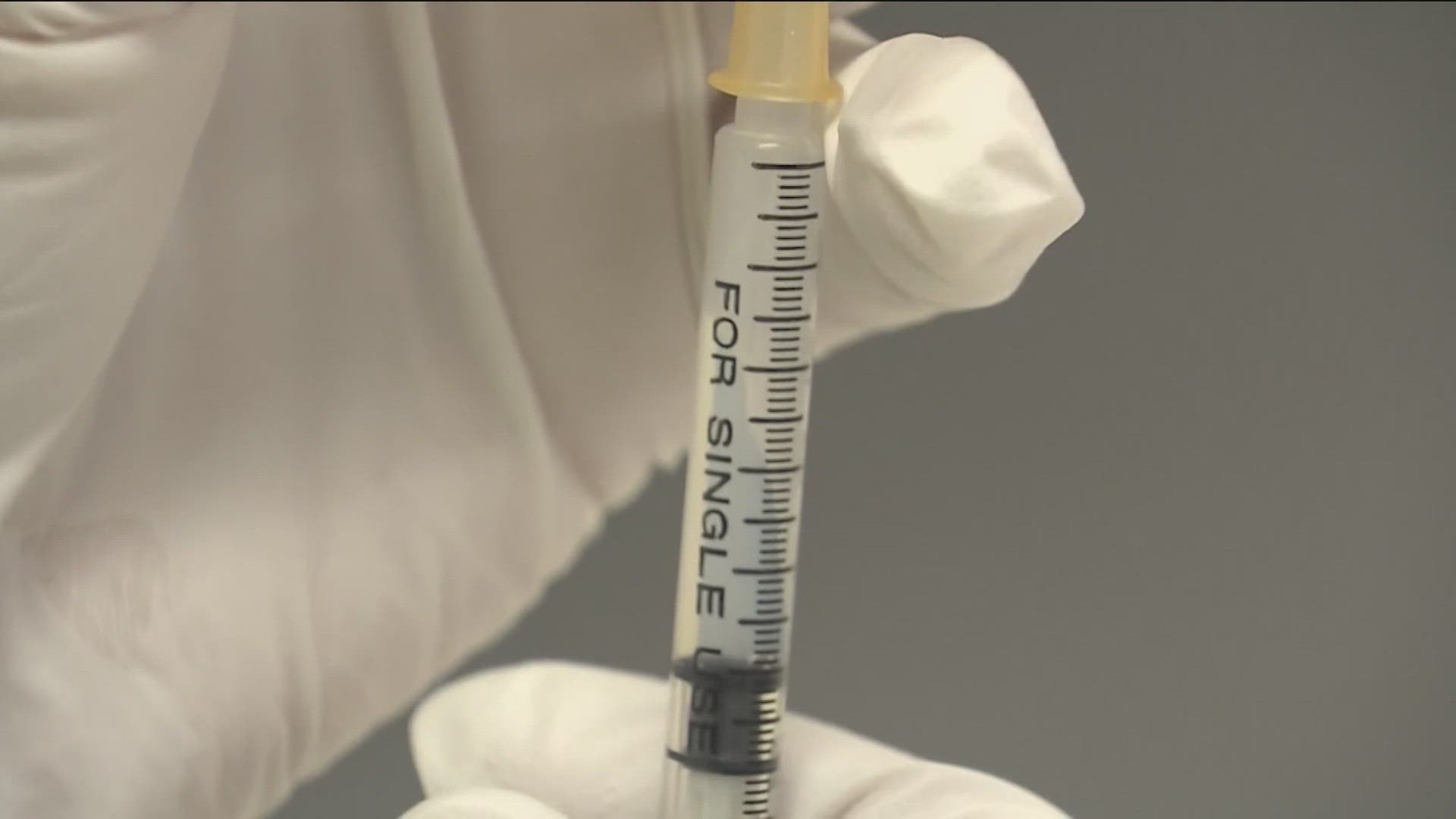BOISE, Idaho — Idaho Gov. Brad Little said Wednesday that he’s been talking with state legislators who want him to call a special session of the Legislature, but the Idaho Constitution requires such sessions to be called on a specific subject — and none of them have offered him one.
Little, who said he was just on a call with the entire House and Senate that morning, and met on Tuesday with both lawmakers and members of legislative leadership, said, “I have yet to get the Legislature to say, ‘We want a special session for this issue.’ They want to have a special session for a lot of different issues. And frankly, I’ve said I’m not opposed to a special session — you tell me what the issue is.”
The Idaho Constitution, in Article IV, Section 9, says, “The governor may, on extraordinary occasions, convene the legislature by proclamation, stating the purposes for which he has convened it; but when so convened it shall have no power to legislate on any subjects other than those specified in the proclamation.”
Little said there are “probably three things that come to the top”: Plans for the November election; what to do about the January legislative session if the virus is still spreading “and they don’t want to meet”; and a more complex issue involving civil liability and COVID-19.
“But the founders of our Constitution specified special sessions will only be called by the governor, and they’ll be called by the governor for a specific purpose,” he said.
On Tuesday, 15 House Republicans, who had been called on by the Idaho Freedom Foundation and an unregistered political action committee called the Freedom Man PAC to attempt to call themselves into session and pass legislation, based on a legal opinion the Freedom Foundation commissioned from an Arizona law firm, held a gathering in the House chamber, but took no votes and attempted no action. Rep. Judy Boyle, R-Midvale, explained that the gathering wasn’t a session of the Legislature because the group lacked a quorum, which would require a majority of the House and Senate.
Urged on by a boisterous crowd of supporters in the gallery, many of whom were armed, the lawmakers aired grievances about Little’s handling of the COVID-19 pandemic, with Rep. Heather Scott, R-Blanchard, calling Little a “self-appointed tyrant” and Boyle declaring, “He’s usurped our power.”
Little was asked about a special session by a caller from Idaho County named Jenny, during his weekly statewide call-in about the state’s coronavirus response with AARP Idaho. The caller demanded that Little call a special session and “return Idaho to its republican form of government,” decrying the spending of federal CARES Act aid money by “a board of individuals who were appointed by you and were never elected by anyone in our state.”
Little noted that his Coronavirus Financial Advisory Committee, or CFAC, includes the co-chairmen of the Legislature’s Joint Finance-Appropriations Committee, which appropriates state funds. Those co-chairs are Rep. Rick Youngblood, R-Nampa, and Sen. Steve Bair, R-Blackfoot. “They’re duly elected by the people of the state of Idaho, duly selected by the bodies that are there,” the governor said.
CFAC also includes Lt. Gov. Janice McGeachin, who is a statewide elected official; a representative of the Legislature’s minority party, Rep. Melissa Wintrow, D-Boise, who also serves on JFAC; the elected mayor of Garden City, representing Idaho cities; and 10 other members, representing major state agencies, Idaho local and tribal governments, and large and small Idaho businesses.
“They’re part of the group that basically makes recommendations to me, to how do we allocate the money that was given to the governors by Congress for the specific point of what do you do to ameliorate the negative impacts of the COVID virus,” Little said.
Those spending priorities were detailed in a front-page article Sunday in the Idaho Press titled “How Idaho is spending its $1.25B in CARES Act funds, and how you can apply for it,” and expenditures of the funds are being posted publicly on state Controller Brandon Woolf’s “Transparent Idaho” website.
“I am certain, and the attorney general agrees with me, that I am following the laws of Idaho,” Little declared.
“I understand the frustration, I understand the anger — I understand that people are upset about schools being out, lost jobs, loss of income,” he said. “But I’m following the U.S. Constitution, I’m following the Idaho Constitution, I’m upholding my oath of office as governor of the state of Idaho.”
The same caller a week earlier demanded to know why the governor had placed the state under “martial law.” He hadn’t, he responded; Idaho Attorney General Lawrence Wasden, who also was on the call last week to answer questions, added, “And we’ve never been under martial law.”
Right-wing groups that have been critical of the governor’s coronavirus response have made the martial law claim repeatedly, apparently based on a misreading of the “extreme emergency” section in Idaho state law that the governor invoked when he issued his statewide stay-home order March 25; it was lifted April 30.
That law, Idaho Code 46-601, details the governor’s powers for “any proclaimed state of extreme emergency, insurrection or martial law,” but he invoked only the extreme emergency section.
Extreme emergencies have been declared more than 30 times in Idaho since 1977, mostly for forest fires or floods.
During the AARP call on Wednesday, U.S. Sen. Mike Crapo, R-Idaho, praised Little’s response to COVID-19.
“I’ve got to just give kudos to Gov. Little, who has done just an incredible job,” Crapo said, including reducing state regulations and expanding Idahoans’ access to telehealth services, which Crapo said “we want to mirror … on the federal level.”
“Governor, I just can’t give you enough credit for the incredible leadership that you’ve provided,” Crapo said. “I’ve been able to observe, from my position, the way that governors across this country have dealt with this pandemic, and once again, Idaho’s leadership is sterling and an example to the rest of the country.”
Several other callers also praised Little’s leadership through the pandemic, while others asked questions about access to benefits, testing, and why Little hasn’t mandated mask-wearing to prevent the spread of the virus.
“I was told there was a meeting over in Boise with some of the legislators and nobody was wearing masks,” said a caller named Mary Etta, 73. “I would very much like to know a reason why we’re not requiring masks.”
Little said he strongly encourages Idahoans to wear masks. “I’m a big advocate for it,” he said, “but as you probably know, we’re not big on government mandates in Idaho.”
If you enjoy reading articles like this one from our partners at the Idaho Press, please consider subscribing to them for newspaper delivery or digital access to help ensure stories like this are told.
More from our partner Idaho Press: Longtime Community Council Head Start center coordinator retires
At KTVB, we’re focusing our news coverage on the facts and not the fear around the virus. To see our full coverage, visit our coronavirus section, here: www.ktvb.com/coronavirus.
Facts not fear: More on coronavirus
See our latest updates in our YouTube playlist:



